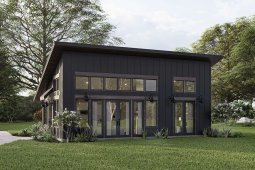chrisstratton
New Member
- Joined
- May 24, 2021
- Messages
- 119
Hello helpful people!
I just sold my DIY solar camper after 2 years. You guys were great in helping me design and execute that. 1740 solar on roof, 3000 Growatt, 24v150ah LifFePO4, 12k btuh heat pump. That system ran the A/C and fridge almost 24/7 for the two years.
So - I'm coming back to the well again. We bought a small property in Rural NH and are seeking a permit now. Basically, it is a one bedroom, w/ full basement. I have a wide range of questions and I value your opinions and am requesting them.

Desired design - 720 SF Cottage, slant roof
Bad Idea?
Does anyone have any idea if an off grid powered property has a diminished or enhance re-sale value? What about snow clearing in NH off the panels? Is that a big deal. Basically thinking to have no grid tie option - no power from the grid.
Permitting
1) Does anyone have any leads on resources regarding land owner restrictions so I can bone up on those, namely, where does a registered electrician come in on a self built, stand alone house? I'd like a builder to frame, insulate, drywall, roof, exterior (windows, etc), and perhaps rough wiring and plumbing. Not sure of sequence of approvals (this is in Washington NH) - I realize the question is way out there, but you guys are great, and someone here might actually know and be willing to help. Would love to hear others experiences of new construction off grid in New England
Down to more common questions
2) Well pump. Presumably 180' ish well w/ submerged pump? Which pump to get? or soft start? or pump and holding tank and another pump?
3) Hot water heater - should I bother w/ those super efficient, super expensive heat pump ones?
4) My thought is about 7kw PV panels on the roof, and a Growatt | 8kW Split Phase Off-Grid Inverter, plus a propane backup generator of about 7kw. And perhaps 48V Lithium Battery 120Ah 6 kWh LFP. Does this seem reasonable? What about automatic switch-over? I saw some discussion about C and NO and wonder about practical results of whatever that is to fire up and release the generator.
5) Heatpump. I figure a regular efficiency heatpump for A/C and some heating, with a backup of either a pellet stove or propane in the basement. Probably propane. I am thinking to setup for easy winterization and maybe going that route for Dec-March. Thoughts?
I just sold my DIY solar camper after 2 years. You guys were great in helping me design and execute that. 1740 solar on roof, 3000 Growatt, 24v150ah LifFePO4, 12k btuh heat pump. That system ran the A/C and fridge almost 24/7 for the two years.
So - I'm coming back to the well again. We bought a small property in Rural NH and are seeking a permit now. Basically, it is a one bedroom, w/ full basement. I have a wide range of questions and I value your opinions and am requesting them.

Desired design - 720 SF Cottage, slant roof
Bad Idea?
Does anyone have any idea if an off grid powered property has a diminished or enhance re-sale value? What about snow clearing in NH off the panels? Is that a big deal. Basically thinking to have no grid tie option - no power from the grid.
Permitting
1) Does anyone have any leads on resources regarding land owner restrictions so I can bone up on those, namely, where does a registered electrician come in on a self built, stand alone house? I'd like a builder to frame, insulate, drywall, roof, exterior (windows, etc), and perhaps rough wiring and plumbing. Not sure of sequence of approvals (this is in Washington NH) - I realize the question is way out there, but you guys are great, and someone here might actually know and be willing to help. Would love to hear others experiences of new construction off grid in New England
Down to more common questions
2) Well pump. Presumably 180' ish well w/ submerged pump? Which pump to get? or soft start? or pump and holding tank and another pump?
3) Hot water heater - should I bother w/ those super efficient, super expensive heat pump ones?
4) My thought is about 7kw PV panels on the roof, and a Growatt | 8kW Split Phase Off-Grid Inverter, plus a propane backup generator of about 7kw. And perhaps 48V Lithium Battery 120Ah 6 kWh LFP. Does this seem reasonable? What about automatic switch-over? I saw some discussion about C and NO and wonder about practical results of whatever that is to fire up and release the generator.
5) Heatpump. I figure a regular efficiency heatpump for A/C and some heating, with a backup of either a pellet stove or propane in the basement. Probably propane. I am thinking to setup for easy winterization and maybe going that route for Dec-March. Thoughts?
Last edited:


